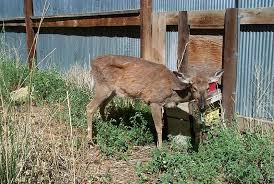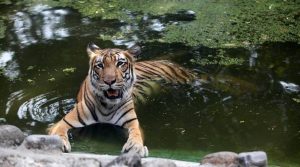Today’s Current Affairs: 16th January 2025 for UPSC IAS exams, State PSC exams, SSC CGL, State SSC, RRB, Railways, Banking Exam & IBPS, etc
Table of Contents
Action Plan For Pollution In The Pavana River:

The National Green Tribunal recently directed the state-appointed rejuvenation committee to convene a meeting of stakeholders to set a new timeline for implementing the action plan that would tackle pollution in the Pavana river.
- Pavana River is situated in the west of Maharashtra, in the Pune District.
- The river is a notable river crossing Pune city and divides Pune City and the Pimpri-Chinchwad area.
- It originates from the Western Ghats, about 6 km south of Lonavala.
- Flowing eastward initially, it becomes southbound and passes through the suburbs of Dehu, Chinchwad, Pimpri, and Dapodi before its confluence with the Mula River near Pune city.
- Mula River, which later merges with the Mutha River, forming the Mula-Mutha River, ultimately drains into the Bhima River (largest tributary of the Krishna River).
- Total Length: Approximately 60 km long.
- A dam is built on this river at Pavana Nagar, called the “Pavana Nagar Dam”.
- It is an earthfill gravity dam.
- It is 1,329 m (4,360 ft) long and 42.37 m (139.0 ft) high, with a gross storage capacity of 30,500.00 km3.
- It is built with the purpose of providing sufficient water to the nearby localities.
- It provides drinking water to Pune and Pimpri-Chinchwad.
Bhargavastra : Succesfully Tested

India has successfully tested the Bhargavastra, its first micro-missile system designed to counter swarm drones.
- Bhargavastra is India’s first indigenous micro-missile system designed to take on the threat of swarm drones.
- It was developed by the Economic Explosives Ltd.
- It can quickly deploy on a mobile platform and hit targets over 2.5 km.
- It is capable of detecting even small incoming flying machines at over 6 km and can take them down using micro munitions that can be guided towards the threat.
- The system can simultaneously fire more than 64 micro missiles.
- It is designed to operate in all terrains, including high-altitude areas, to meet specific requirements of the armed forces.
- Designed to meet the requirements of the Army Air Defence, this is the first counter-drone system that uses micro missiles.
National Bureau of Fish Genetic Resources:

Around 100 tribal persons of Pulicat region will undergo intense training in pearl spot culture, crab fattening clownfish aquaculture being organised by the National Bureau of Fish Genetic Resources.
- It was established in December 1983 in Allahabad under the aegis of Indian Council of Agricultural Research (ICAR) to undertake research related to the conservation of fish germplasm resources of the country.
- The Bureau’s permanent infrastructure was developed at Lucknow, Uttar Pradesh in 1999.
- The Institute’s vision is assessment and conservation of fish genetic resources for intellectual property protection, sustainable utilization and posterity.
- They work to identify, document, and conserve the genetic diversity of fish species, which is important for maintaining healthy and sustainable fish populations.
- The Bureau has developed modern facilities, multidimensional strategies and technological capabilities to achieve its mandate related to database development, genotyping, registration of aquatic germplasm, genebanking and evaluation of endangered and exotic fish species.
Zombie Deer Disease:

Scientists express concern over the possibility of the deadly and incurable ‘zombie deer’ disease affecting humans.
- Zombie Deer Disease scientifically as Chronic Wasting Disease (CWD), it is a progressive and fatal neurological disease which primarily affects deer, elk, moose, and reindeer.
- It is caused by infectious proteins called prions.
- Prions are misfolded proteins that cause other proteins in the brain to likewise misfold, ultimately leading to brain damage.
- Once these proteins accumulate in the brain, they create spongy holes in the tissue, resulting in severe neurological dysfunction.
- CWD prions are highly contagious and spread through body fluids such as saliva, faeces, blood, or urine, either by direct contact or environmental contamination.
- It is always fatal in infected animals. There is no vaccine or treatment.
- So far, there has been no confirmed case of CWD transmission to humans. However, experts remain cautious.
Shikari Devi Wildlife Sanctuary:

The Government of India has designated areas around Shikari Devi Wildlife Sanctuary, located in Mandi district, as eco-sensitive zones (ESZs) to reduce the impact of urbanisation and developmental activities on the surrounding protected areas.
- It is located in the district of Mandi in Himachal Pradesh.
- It covers the middle altitudinal range from 1,800 to 3,400 m of the Himalayas, showing the transition from pine through oak to alpine meadow.
- This sanctuary is named after the goddess Shikari Devi, to whom a temple is dedicated and the place is considered sacred by Hindus.
- The temple is positioned in the middle of snow-capped mountains and dense pine trees at an elevation of 2850 m above sea level.
- An area of 7,200 ha surrounding the temple was declared a sanctuary in 1962.
- It is home to different species of animals and birds, including the goral, monal, black bear, barking deer, musk deer, cat leopard, and the Himalayan black bear.
- We can also see the Himalayan palm civet, barking deer, marten, Indian porcupine, Kashmiri flying squirrel, musk deer, common langur, leopard, common squirrel and snow leopard inhabiting the sanctuary.
Falcated duck : Spotted

Birders at the Sultanpur National Park in Gurugram, Haryana experienced this delight as they spotted a Falcated Duck.
- Falcated duck is also known as falcated teal(Mareca falcata) is a gadwall-sized dabbling duck.
- It is from eastern Siberia and Mongolia to northern Japan with wintering grounds in southeast Asia to eastern India. There have also been sightings of falcated teals in America, Poland and Thailand.
- They are normally found in freshwater lakes, ponds, rivers and marshes that are surrounded by forest.
- The breeding season of this species is from May to early July. They make their nests on the ground near water, usually in tall grass or brush.
- They are mostly herbivorous, and eat vegetable matter, seeds, rice and aquatic plants. Occasionally they also consume small invertebrates and soft-shelled mollusks.
- The sightings of the Falcated Ducks in India are irregular and can be termed as ‘rare’.
- A primary threat to the falcated duck is hunting, as people want them for food and their feathers.
- Conservation Status: IUCN: Near Threatened
National Turmeric Board:

The Union Minister for Commerce and Industry inaugurated the National Turmeric Board in New Delhi.
- It will provide leadership on turmeric related matters, augment the efforts, and facilitate greater coordination with Spices Board and other Government agencies in development and growth of the turmeric sector.
- Composition of Board:
- A Chairperson to be appointed by the Central Government.
- A Secretary to be appointed by the Department of Commerce.
- Members from the Ministry of AYUSH, Departments of Pharmaceuticals, Agriculture & Farmers Welfare, Commerce & Industry of the Union Government.
- Representatives from the top two turmeric growing states of Maharashtra and Telangana and from the state of Meghalaya. States will be represented on the Board by rotation.
- Select national/state institutions involved in research, representatives of turmeric farmers and exporters.
- The Board will focus on key areas such as research and development, value addition to turmeric products, and promoting awareness of the spice’s medicinal and essential properties.
- It will also work on improving turmeric yield, enhancing logistics and supply chains, and exploring new international markets for turmeric.
- Ensuring quality and safety standards for turmeric production and exports will also be a critical aspect of the Board’s mandate.
- Headquarter: Nizamabad, Telangana
Telecom Technology Development Fund:
The Centre for Development of Telematics (C-DOT) has signed an agreement with the Indian Institute of Technology Delhi (IIT Delhi) for the development of “Building Blocks for THz Communication Front Ends”for 6G under the Telecom Technology Development Fund (TTDF).Telecom Technology Development Fund has been setup under Universal Services Obligation Fund (USOF) of Department of Telecom (DOT), Government of India. USOF is now called Digital Bharat Nidhi.
India’s Genomic Data Set:
India achieved a historic milestone at the Genome India Data Conclave in New Delhi with the launch of the Indian Genomic Data (IGD) Set under the GenomeIndia Project (GIP) and frameworks like the Framework for Exchange of Data Protocols (FeED) and the Indian Biological Data Centre (IBDC) Portals.These initiatives position India as a leader in genomics, providing global researchers access to genome samples and achieving self-reliance in genomic data.
Nobel Winning Research on C. Elegans:
The roundworm Caenorhabditis elegans has played a pivotal role in numerous Nobel Prize-winning discoveries, shedding light on fundamental biological processes.Victor Ambros and Gary Ruvkun (2024 Nobel Prize in Physiology or Medicine): Discovered microRNAs and their crucial role in gene expression control. Osamu Shimomura, Martin Chalfie, and Roger Tsien (2008 Nobel Prize in Chemistry): Developed green fluorescent protein (GFP), enabling live-cell imaging and revolutionizing biological research.
Chimpanzee Conservation:
NGO Papaye International in Cameroon has been in the news, which operates a sanctuary for orphaned chimpanzees in the Douala-Edea National Park.Chimpanzees (Pan troglodytes ssp.) are one of our nearest living relatives, sharing a common ancestor with humans that lived approximately 7-8 million years ago.Four recognized subspecies: Central chimpanzee, Western chimpanzee, Nigeria-Cameroon chimpanzee, and Eastern chimpanzee. IUCN Status: Chimpanzees listed as endangered, with Western chimpanzees classified as Critically Endangered.
Atomic Energy Commission Reconstituted:
The government has recently reconstituted the Atomic Energy Commission (AEC).Ajit Kumar Mohanty, Secretary, Department of Atomic Energy (DAE), is the Chairman of the AEC and National Security Adviser Ajit Doval is among the key members.AEC was first established in August 1948 to oversee atomic energy research under the Department of Scientific Research.
77th India Army Day:
Indian Army Day is celebrated annually on 15th January to commemorate the appointment of General (later Field Marshal) K. M. Cariappa as the first Indian Commander-in-Chief of the Indian Army in 1949.He succeeded British General Sir F. R. R. Bucher, marking a historic moment in India’s post-independence military leadership.2025 Theme: ‘Samarth Bharat, Saksham Sena’ (Capable India, Empowered Army).
First Private Satellite Constellation:
India’s space industry marked a historic milestone with the launch of its first private satellite constellation by Google-backed Pixxel, a Bengaluru-based space-tech startup.A private satellite constellation of six hyperspectral imaging satellites launched by Pixxel, backed by Google.Developed by Pixxel, with collaboration from SpaceX, which facilitated the launch. Launch location: Vandenberg Space Force Base, California, USA. Aim: To provide high-resolution hyperspectral imaging to improve insights in agriculture, mining, environmental monitoring, defense, and resource management.
Kumani Bank Mud Volcano:
The Kumani Bank mud volcano, located off Azerbaijan’s eastern coast, erupted in 2023, creating a short-lived island, popularly termed a “Ghost Island.” By the end of 2024, this ephemeral island had largely eroded back into the sea. Kumani Bank Mud Volcano is Situated approximately 25 km (15 miles) off the eastern coast of Azerbaijan in the Caspian Sea. A Ghost Island refers to a temporary landmass created by volcanic activity, particularly mud volcanoes, that erodes back into the water over time.
India’s new law for appointing the Chief Election Commissioner:
The appointment procedure for India’s Chief Election Commissioner (CEC) and Election Commissioners (ECs) has undergone significant changes with the enactment of the Chief Election Commissioner and Other Election Commissioners (Appointment, Conditions of Service and Term of Office) Act, 2023. This legislation introduces a structured selection process aimed at enhancing transparency and accountability in the Election Commission of India.
India to Host 28th Commonwealth Parliamentary Conference in 2026:
India is set to host the 28th Conference of Speakers and Presiding Officers of Parliaments of Commonwealth Countries (CSPOC) in January 2026. Lok Sabha Speaker Om Birla announced this during the CSPOC Standing Committee Meeting in Guernsey. The conference will focus on the integration of artificial intelligence (AI) and social media into parliamentary processes, reflecting India’s commitment to technological advancement and modern governance.
Vice President Jagdeep Dhankhar launched Dr. K.S. Chauhan’s book:
Vice President Jagdeep Dhankhar launched Dr. K.S. Chauhan’s book “Parliament: Powers, Functions & Privileges; A Comparative Constitutional Perspective”. During the event, Dhankhar lauded the author’s dedication and hard work in exploring the intricate role of Parliament in a democracy.
Thalai Pongal Celebration:
Thalai Pongal, the first day of the Tamil month, is a significant harvest festival celebrated with fervor across Tamil Nadu. On January 14, 2025, Supriya, a physician from Tripura, and her husband, Thileepan from Sathankulam in Thoothukudi district, celebrated the festival in a traditional Tamil manner. Supriya, who is originally from Tripura, shared how the Pongal festival in her hometown is celebrated differently, where it is known as “Hangrai”. Her participation in this celebration highlighted the cultural diversity and significance of Pongal in uniting people from different regions and communities.
Boda Tyohar:
The Boda Tyohar festival, also known as Magho ko Tyohar, is the largest annual celebration for the Hatti tribes of Himachal Pradesh’s Trans-Giri region. Celebrated by over three lakh members of the Hatti community, this month-long festival marks the end of the ‘Magha’ month and is characterized by unique cultural practices, rituals, and a strong sense of community unity.




